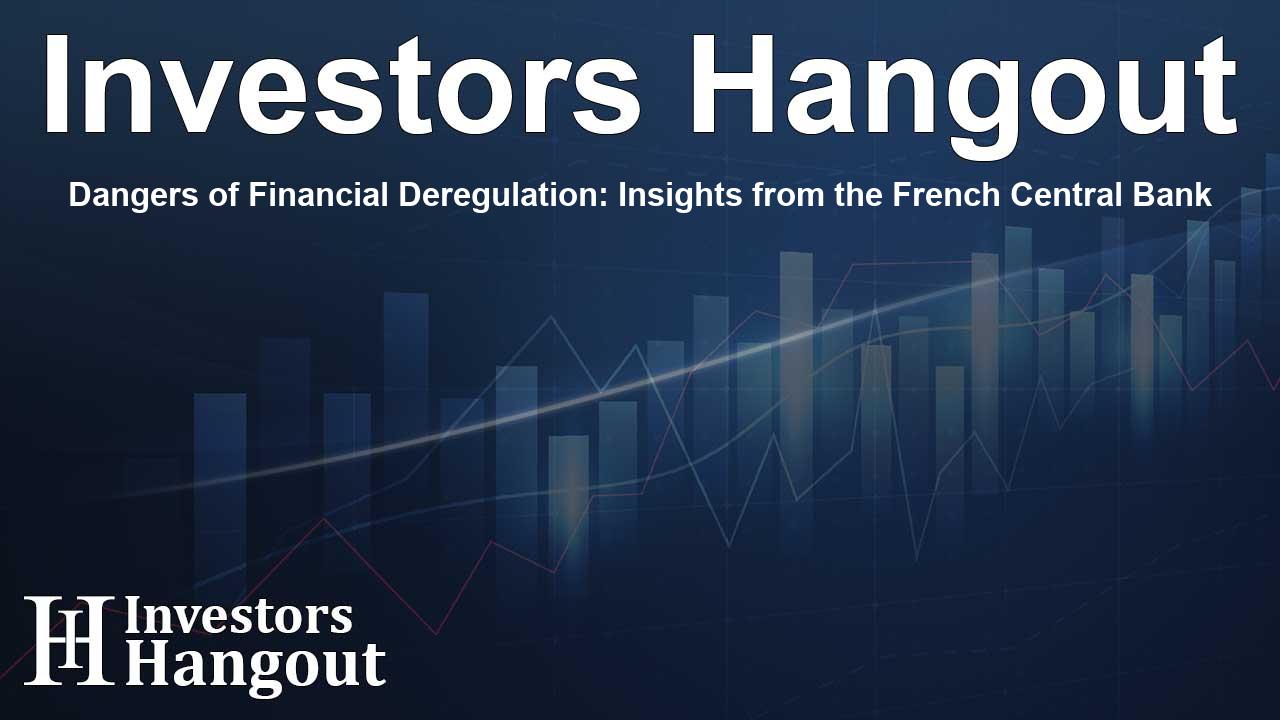Dangers of Financial Deregulation: Insights from the French Central Bank

Dangers of Financial Deregulation Highlighted by French Central Bank
In a recent statement, the governor of France's central bank cautioned that any efforts to push for financial deregulation in the U.S. could significantly raise the likelihood of a financial crisis in the future. This warning comes amid discussions surrounding the broader implications of potential changes in the regulatory landscape.
Impact of U.S. Policy Changes on Global Stability
The dialogue around financial regulation has gained prominence with the prospect of the incoming U.S. administration under President-elect Donald Trump. Analysts are eying this transition closely, as it may herald substantial amendments to the established regulations that have governed financial services and banking for decades. This includes considerations for digital currencies, a booming sector requiring careful regulatory oversight.
Statements from the Bank of France
Francois Villeroy de Galhau, the governor of the Bank of France, expressed his worries during a session with the French Senate's finance committee. He articulated that such a deregulation push could jeopardize not only the U.S. financial system but ultimately the global economic framework as well. His insights point to the intricate interconnections that exist within the worldwide financial systems.
Proposals for a Lighter Regulatory Touch
Trevor Hill, a potential candidate for a U.S. banking regulator position, recently shared extensive plans advocating for a lighter regulatory approach. His proposals include adjusting capital reserves and revising the stance on cryptocurrencies. Such changes could reshape the banking landscape and foster an environment less stringent for financial institutions.
Concerns Over Capital Requirements
Hill's remarks indicate a possible retreat from enforcing new capital requirements on large banks, which align with international Basel III standards. These regulations have met delays in the U.S., contrasting with the majority of countries that have already embraced them. The implications of this delay could ripple through the global financial market, raising red flags for international investors and stakeholders alike.
The European Response to Deregulation
Villeroy highlighted that while Basel III plays a crucial role in maintaining European banking stability, it is vital to consider adjustments that ensure competitiveness within the sector. The challenge lies in finding a balance that promotes innovation while safeguarding financial stability.
Risks of Lax Regulation for Non-Bank Financial Actors
Furthermore, Villeroy pointed out that overly relaxed regulations for non-bank financial entities, such as various funds and venture capitalists, as well as the burgeoning field of cryptoassets, could pose significant risks to financial stability. The intricate nature of these financial actors necessitates a comprehensive regulatory framework to avoid vulnerabilities within the system.
Final Thoughts on Regulatory Futures
As the discussions continue, it's clear that the path toward deregulation carries complexities that require careful consideration. Regulatory measures not only protect the integrity of financial systems but also ensure the safeguarding of global economic stability. The evolving landscape will be closely monitored by financial leaders worldwide, who will undoubtedly study how these changes in the U.S. may influence international practices and standards.
Frequently Asked Questions
What did the French central bank chief warn about?
The chief warned that financial deregulation in the U.S. could increase the risk of a future financial crisis.
How might U.S. policy changes affect global markets?
Changes could lead to instability and uncertainty, impacting investor confidence and international regulations.
Who is Trevor Hill?
Trevor Hill is a potential U.S. banking regulator candidate advocating for a lighter regulatory touch on banks.
What are Basel III regulations?
Basel III is a set of international banking regulations established to promote stability in the banking sector.
What risks do non-bank financial actors face?
The risks include increased vulnerability due to relaxed regulatory oversight, which could destabilize financial systems.
About The Author
Contact Caleb Price privately here. Or send an email with ATTN: Caleb Price as the subject to contact@investorshangout.com.
About Investors Hangout
Investors Hangout is a leading online stock forum for financial discussion and learning, offering a wide range of free tools and resources. It draws in traders of all levels, who exchange market knowledge, investigate trading tactics, and keep an eye on industry developments in real time. Featuring financial articles, stock message boards, quotes, charts, company profiles, and live news updates. Through cooperative learning and a wealth of informational resources, it helps users from novices creating their first portfolios to experts honing their techniques. Join Investors Hangout today: https://investorshangout.com/
The content of this article is based on factual, publicly available information and does not represent legal, financial, or investment advice. Investors Hangout does not offer financial advice, and the author is not a licensed financial advisor. Consult a qualified advisor before making any financial or investment decisions based on this article. This article should not be considered advice to purchase, sell, or hold any securities or other investments. If any of the material provided here is inaccurate, please contact us for corrections.
